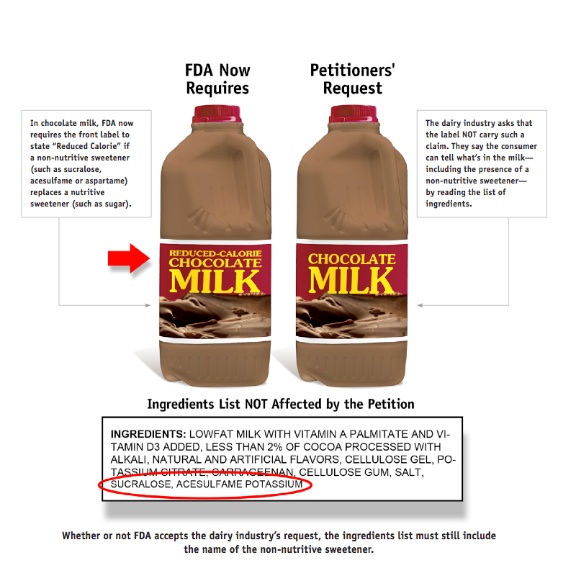The Food and Drug Administration (FDA) wants your opinion on new dairy product labels. A petition submitted to the FDA states that industry groups believe labels such as “no added sugar” or “reduced calorie” are a “turn-off” to kids who may otherwise drink flavored milk with non-nutritive (artificial) sweeteners at the school cafeteria and other venues. The petition is from the International Dairy Foods Association (IDFA) and the National Milk Producers Federation (NMPF).
The comment period for this proposed change is open until May 21, 2013. FDA has received more than 30,000 comments on this issue to date. But it seems that many consumers are confused about what the labeling change means.
The petition would change the “standard of identity” for milk, which determines what ingredients food products must (or may) contain to be marketed under certain names. At this time, a manufacturer must modify the name of the food with a nutrient content claim (such as “reduced calorie”) if the product contains an ingredient that isn’t in the current standard of identity. For example, if chocolate milk is made with aspartame or sucralose, which are not present in ordinary milk, the label must state “reduced calorie”. The artificial sweetener in question must still be in the list of ingredients on the product label.
The industry wants the FDA to amend the standard of identity for flavored milk and 17 other dairy products, including nonfat dry milk, heavy cream, eggnog, half-and-half and sour cream) so non-nutritive [artificial] sweeteners are included among the standard ingredients. The groups want the change because school-age children are more likely to consume flavored milk than regular milk and that the proposed amendments would “promote more healthful eating practices and reduce childhood obesity.”
But recent studies have shown that consumption of artificial sweeteners may be tied to the obesity epidemic. In fact, a 2011 study published in Pediatric Obesity states that data from large epidemiologic studies “support the existence of an association between artificially-sweetened beverage consumption and weight gain in children.”
Image courtesy FDA





